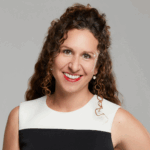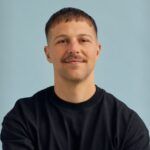Spending more than a decade of her life modelling for some of the most prestigious Fashion Houses around the world, Sarah Tilleke is not one to shy away from new opportunities.
Growing up in Perth’s northern coastal suburbs, the Curtin Business School graduate’s parents instilled in her the importance of independence from a young age.
Since starting her modelling career at the age of 16, Sarah has spent more than a decade of her life perfecting her craft, working with some of the world’s biggest fashion brands, including Burberry and Hugo Boss, and esteemed industry icons, like Naomi Campbell.
Hanging up her heels for a business jacket, Sarah is now on the cutting edge of technology innovation, working as a Senior Enterprise Solutions Consultant at Adobe, where she provides digital solutions for some of Australia’s largest organisations.
Did you always want to pursue a business career?
Spending more than a decade of my early life modelling around the world, I always knew I would return to a steady career.
Starting modelling straight out of high school exposed me to a wide array of opportunities that allowed me to travel, work across different cultures, countries, and meet many kinds of people. This was a great foundation for the first decade of my career.
However, pursuing business was always the long-term plan. I always wanted a job that connected me to industry and gave me a chance to contribute to solving complex business problems, which is something I find very fulfilling.

Just before the start of the COVID pandemic in early 2020, I had unknowingly timed my exit strategy from modelling to business perfectly. For the past several years, I had been working to complete my Bachelor of Commerce through flexible online study, which was made possible through Curtin’s various satellite campuses around the world.
What lessons did you learn from modelling that you carry with you in business?
I moved to Sydney when I was 17, to further my modelling career which eventually took me abroad.
Initially, I went through a challenging period marked by frequent rejections and tough industry pressures, which led me to question whether I wanted to continue in modelling. However, despite these setbacks, new work opportunities always kept coming.
During that time, I had to reflect and remind myself not to spend my energy focusing on the rejection and instead reframe my thinking to acknowledge that by all other measures, I was succeeding at what I was doing.
Ultimately, being able to sustain work and a steady income signalled to me that I belonged in the industry. Being passed over for a role doesn’t reflect a personal flaw; it often simply means you weren’t the right fit for that client’s needs or circumstances at the time.
As a model, you need to develop your personal brand to sustain yourself in the industry. This also means looking after yourself, being comfortable with speaking up, and knowing when to assert your boundaries while remaining professional.

In business, understanding the unique value you can add to a situation, advocating for your abilities, and being able to tell your story with confidence are similarly critical. There’s a lot that can be said for embracing the opportunity to stand out, even though this can feel counter to our cultural tendencies as Australians.
For me, so much has come from simply throwing my hat in the ring and daring to try. Getting out there and gaining that exposure all contributes to your personal and professional development, whether it be attending networking events or volunteering to take on stretch projects.
Do you have any standout mentors in your early career who have helped shape you into who you are today?
One of my biggest mentors was Naomi Campbell.
When I worked on a project with her in 2013, she shared this advice, which I now live by, ‘Never rest on your laurels,’ meaning not to become complacent or entitled due to past successes. Even as you become accomplished, it’s important to keep stretching, learning, and finding new ways to grow.
At the end of the day, showing up and working hard is more valuable than depending solely on past achievements to carry you forward. In our careers and life, I don’t believe that we ever truly “arrive”; so, we should be striving for a constant journey of growth.
I’m also grateful for my university mentors, particularly my Business Capstone Tutor, Mel Ahmad, who taught me the importance of approaching new business challenges with creativity, advocating for your abilities as a graduate, and trusting the right business will recognise the unique value you can bring.
What do you love the most about working at Adobe?
Since joining Adobe as an Inside Sales Graduate, I’ve worked across both the Mar-Tech and Creative sides of the business, before becoming a Solutions Consultant for our Digital Media Technology.
Recently, I was promoted to Senior Enterprise Solutions Consultant, where I work closely with some of Australia’s biggest enterprises to educate and inspire them on what’s possible with the Adobe offering and how it can be best leveraged in their business.

What I love the most about the role is that we are responsible for being on the cutting edge of technology and industry transformation.
Getting insight into how some of Australia’s biggest organisations function, make their decisions, and approach innovation and change management is also very interesting. There’s a lot to love!
What is the biggest piece of advice you would tell your younger self?
1. Use extracurricular activities to stand out.
In the early stages of your career, although your degree is important in getting your foot in the door, what allows people to connect with you is your interests, attitude, and work ethic. The extra-curricular activities you are involved in outside of work help bolster your resume.
As an avid swimmer who has competed in the Rottnest Channel Swim, this experience has been a great conversation starter as a graduate and allowed the leadership team at my workplace to form a picture of who I was outside of my degree’s credentials.
If I could do it again, I would tell my younger self to start or get involved with a club at university. Ultimately, business leaders want people who are willing to contribute, and if there’s evidence of that, then you’re more inclined to break through the masses.
2. Aim high, put your hat in the ring. Don’t be afraid of risk and failing fast.
What’s the worst that can happen – if they say no, at least you tried.
If you can walk away knowing that you gave it your all, then that’s all you can do. Be proud of yourself for taking the risk; anything outside of your control is just luck and timing.
Don’t be afraid of the risk of failure; it’s only through the mistakes you make that you will learn invaluable life lessons.
3. Putting in the work is the best antidote to impostor syndrome.
Never resting on your laurels and always being ready to put the work in.
It’s normal to experience moments of impostor syndrome, but if you’ve met the expectations and prepared thoroughly, you can trust that you’ve earned your place. So, work hard and have confidence in the process, which sounds cliché, but it’s kind of true.
Putting your hand up for new experiences is so important for your growth, because you never know what might come from it. Putting yourself out there increases the chances of those serendipitous moments happening, which might propel you into becoming the person or professional you aspire to be.
Sarah Tilleke, Senior Enterprise Solutions Consultant at Adobe
Born and raised in Perth, Sarah is an Adobe product expert with more than a decade of experience working in the fashion, advertising, and media & entertainment industries. She has worked for Burberry and Hugo Boss, walked in the prestigious London and Sydney Fashion Weeks, and has been mentored by British supermodel Naomi Campbell. Since graduating from Curtin with a Bachelor of Commerce in Marketing & Management (2021), Sarah is now passionate about helping Australia’s biggest enterprises harness Adobe’s suite of solutions to drive digital transformation and achieve their organisational goals.



